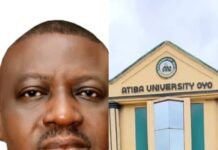In the spirit of Soro Soke initiated by Nigerian youths, I think it is high time Nigerians are informed about what lecturers are doing and with what they are doing it in Nigerian Public universities. This is important in order to furnish the public rightly with facts as against disinformation from the leadership of the country.
I was compelled to put this together after listening to one popular radio programme on Tuesday 3 November, 2020 at Fresh FM, 105.9 in Ibadan. The phone-in programme called Freshly Press was presented by one Mr Promise Inumisan. When the discussion on ASUU was on, someone phoned in and condemned ASUU totally for being on strike. In his angry words, he claimed that when the current lecturers were students, the then lecturers ensured smooth running of the universities. In his own wisdom, ASUU is destroying the university education in Nigeria. As if this is not enough, on the same day, I read in one of the dailies an appeal of Governor of Ekiti State to ASUU. Governor Fayemi revealed that it is ‘ordinary’ Nigerian children who attend public varsities (Of course, we know his children or those of his counterparts do not). With other words, ASUU is being framed as the one delaying the university education of ‘ordinary’ Nigerian children. These are just two of numerous pronouncements from many Nigerians who were either misinformed about the import of the ongoing ASUU strike or trying to mischievously mislead the entire Nigerian populace by defending the irresponsive actions of the Federal Government of Nigeria towards education generally and university education in particular.
I am therefore bold enough to tell my readers that, if you, your child or ward graduated between the year 2010 and year 2019 from any of the public universities in Nigeria, you were produced on the blood and sweat of your lecturers. I do not need to bore you about how FG has been insincere, failed to honour agreements and have been taking university academics for a ride for 11 years. If you want to know about these, just read Oludayo Tade (1) Greedy Nigerian professors and their fat salary (https://tribuneonlineng.com/nigerian-professors-and-their-fat-salaries/) and/or (2) ASUU’s UTAS and FG’s slippery offer (https://www.vanguardngr.com/2020/11/asuus-utas-and-fgs-slippery-offer/) among other publications on why ASUU is on strike.
A specific example to buttress the submissions of Oludayo Tade is the case of an Assistant Lecturer who was employed in the year 2007 with gross pay of ₦81,202.07 ($649.6) per month. Eight years later, the lecturer became Lecturer I with a gross payment of ₦180,524.75 ($907.16 as at then). In 2019, the lecturer same lecturer was promoted to Senior Lecturer cadre with Doctorate Degree and the gross per month was ₦271, 920.43 ($709.98). Kindly note the reduction in the value of the gross pay. US dollar is used as the yardstick to measure the value of the salary because of the nature of the job which is international.
A university lecturer has three main responsibilities namely:
Teaching
Research and
Community services
I will justify my claim via these responsibilities. Let us take them one after the other.
1. Teaching
What to teach: The only thing you get when you get employed as a lecturer in your department is the Course Description. To develop the course content that will be delivered to the students from the course description, one needs to do text analysis/literature review. In this digital age, good amount of money is needed to access current books, journals and other online materials. Since institutional internet facility is not reliable and most of the time, frustrating, lecturers have to buy internet models from their meagre salaries to develop and deliver appropriate course contents. Online is the viable option as the library lacks current good books (Check the Needs Assessment Report of Nigerian Universities, 2012).
How to teach: There is a standard lecturer-students ratio for each course and number of courses expected to be taken by a lecturer as prescribed by NUC. The ratio varies based on the field of specialization. For instance, it is 1:20 for Law, Social Sciences and and Arts(See Abutu,2019; https://www.universityworldnews.com/post.php?story=20191203110613770) while that of science-based fields is less. Unfortunately, majority of the courses have higher number of students to the extent that there are some courses with over 500 students. Some lecturers that have low number of students, most time take more than required number of courses. There are some lecturers teaching 15 courses or more per session! When the examinations are written, lecturers have just two weeks to turn in the results. To meet this result submission deadline, lecturers have to work days and nights to mark the scripts in addition to other departmental responsibilities. When one person takes up the responsibilities of about 10 men, he risks his health and expends his sweat and blood to nurture a system that does not recognize his contributions.
With what to teach: Again, there are needed instructional resources required to deliver lectures in a way that can facilitate teaching and learning. Some of these are comfortable office space, current and appropriate text materials, lap-top, projector, smart boards, 21st century compliance lecture theatres, internet facility, electricity among others. FG attested to the fact that these resources are not available in the universities through their Needs Assessment Reports of Nigerian universities of 2012. Does this mean there should not be teaching in the schools? No, lecturers are still doing the teaching by using their amputated income to buy most essential instructional resources and continue to do the job risking our health. Within the period of two years in one of the most popular universities in southwest, a Faculty lost around five young academic staff whose death were traced to work place stress. Those students taught by the lecturers are graduates today. They are enjoying the certificates lecturers produced risking their lives and paying for using their hard earned money. The issue of inadequate resources used to be pronounced during accreditation exercise. Most times, lecturers have had to contribute money to supply must-have resources for the programme like text materials; ‘lie’ to accreditation teams about office space, human resources (Buying one-day adjunct/associate lecturers) and present certificates and publication the institution never supported just to ensure that the students have accredited programmes! But do the students and their parents appreciate this level of altruism?
2. Research
One expects university system to support the conduct and dissemination of research findings as it is the practices in sane societies. This is never the case in public universities in Nigeria. The idea of research grant is scarcely available; conference attendance grant, which most times, is not fully supported in many of our universities is one in three years. A specific example is when a lecturer attended and presented a paper at a conference in Canada which costs him ₦945,000 and his university supported him with ₦350,000 with strong warning that he should not apply for conference grant in the next three years because the money available is limited compared to number of lecturers who need it. Institutional support for publication is worse. The expectation is that a lecturer must have both local and international publications in reputable journals. Local publication cost is in the neighbourhood of ₦20,000 to ₦40,000 while some international publication outlets charge as high as US$1,500. It is never the practice of Nigerian public university to support cost of publications but it is mandatory for promotion.
Experience in research studies and dissemination of research findings have among other advantages these two – update what to teach and promote the image of the university among comity of reputable institutions. So, if you were taught well and you graduated within the period mentioned earlier from public universities in Nigeria or any Nigeria university is ranked among her peers around the world, the blood and sweat of the lecturers have been used to achieve that feat.
3. Community services
There are two forms of community services common to university lecturers. The first is administrative positions occupied for smooth running of the university. These include serving as Level Coordinators/Staff Adviser, Examination Coordinator, Programme Deputy Coordinator, Head of Units, Head of Department, Sub-deans, Dean of Faculty, Directors of centres and Institute and institution principal officers like VC, DVC and so on. I am bold to tell my readers that most times, lecturers use their personal money to get the jobs done. Whenever you hold any of these positions, you are expected to be paid some allowances by the Federal Government (for those in the Federal universities). I will address the payment of the allowances towards the end of this write up. Institutions support some of these offices so as to facilitate smooth running. But may I inform you that the financial support is ridiculous!. For instance, the Head of Department (HOD) financial support for a month in a particular first generation university is ₦2,000 per month! During academic session, HODs will need nothing less than ₦50,000 to run the department. How do they get money to run the department? Through their hard earned salary. In fact, there are numerous responsibilities taken up by lecturers that originally ought not to have been. Examples are typesetting, moderating and administration of examination questions and other responsibilities that support staff should discharge. But in order to have credible output, lecturers take these responsibilities up using their sweat.
The second type of community service is what we refer to as gown-to-town services. This, most times, is not for our students and I will not discuss it.
Allowances for lecturers’ excess workload
Just like other professionals, there are allowances for lecturers’ excess workload. Some of the excess workloads have been discussed above. Put together, the allowances are what is referred to as Earned Academic Allowances (EAA). What is ideal would be that these allowances should be incorporated into the monthly salary but this has never been the case in federal universities in Nigeria. These allowances have accumulated for years. The one calculated up to 2016, 8% of it was paid and FG of Nigeria is promising to spread the payment of the rest up to 2022. You must have read recently that FG promised to pay ₦30bn out of the calculated EAA but for all university staff. This is laughable – academic staff worked and submitted a verified claims, part of it is to be paid but for academic staff and others! You want to ask, is the money just a bonus? Going by the 2019 Memorandum of Action which President Buhari led FG signed with ASUU, by August 2020, they should have released ₦40bn of the EAA. Do you know the implication of this to university students and their parents from 2010 to 2019? It means, FG of Nigeria has not paid up the subsidy of the cost of that certificate they are holding. Lecturers ensured that they graduated so as not to tie them down because of irresponsible leadership. Hence, they have been asking to be paid for teaching and supervising more than the required number of students.
Lecturers use their blood because they have been working under stressful, unhealthy work environment and unduly workload. They also use their sweat because their salaries do not measure up to what they do and the allowances they earned but that FG has refused to pay them.
May I also inform my readers that the percentage of Nigerian public university lecturers who are also postgraduate students in Nigerian university is above 50% (https://www.universityworldnews.com/post.php?story=20111209195021937). So also is the fact that the largest proportions of public university lecturers have their children or wards in the public universities in Nigeria. It implies that whatever any university student or parents are feeling, ASUU members are feeling the double. Not only is strike delaying their academic careers, stagnating their career development, delaying their children and wives education, as it also affects their livelihood as salaries are stopped during strikes. Their promotion is also not processed.
You might be thinking, lecturers get paid after every strike they embarked upon, just like Mr Promise Inumisan of Fresh FM opined but he was oblivious of the fact that researches and community services are ongoing during strikes. Only the teaching component of our work is withdrawn. A public analyst suggest that whenever ASUU goes on strike, students should not pay the school fees for the session so as to reduce the collateral damage on them. How I wish this can be pushed for ratification in the country.
Let me end this write up by asking those who are appealing to, or condemning ASUU for incessant strike these questions: (1) What have you done to the destruction of public primary and secondary education in Nigeria? (2) What is your plan to give university education to the children of the masses in Nigeria when public university is either destroyed or made inaccessible to them? (3) What does it cost you to speak the truth to power and ask the President Mohammadu Buhari-led Federal Government of Nigeria to honour MoUs and MoA signed with ASUU on negotiation table?
IA. Salami of the Dept. of Early Childhood and Educational Foundations, University of Ibadan
Phone +2348062599060
Email: snappy600@gmail.com






